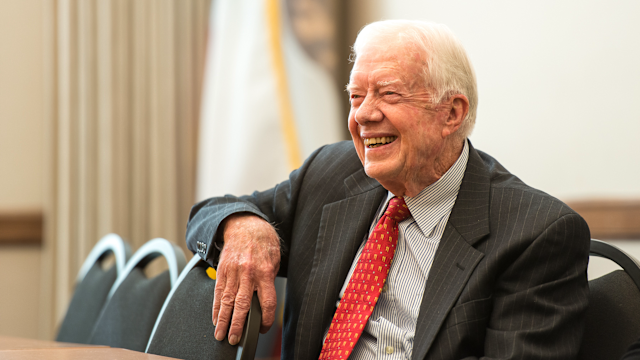Updated on December 29, 2024.
Jimmy Carter, 39th president of the United States and 2002 Nobel Peace Prize winner, died peacefully at home while receiving hospice care. He was 100.
President Carter lived longer than any other U.S. president and remained active well into his 90s, though he had health issues in recent years. In 2015, he was diagnosed with melanoma that spread to his liver and brain. Mr. Carter was declared tumor-free later that year, after receiving radiation and immunotherapy for the cancer. In 2019, the former president broke his hip and his pelvis in separate falls.
President Carter’s life and legacy
James Earl Carter, Jr. was born in 1924 in Plains, Georgia, to James Sr., a peanut farmer, and Bessie, a nurse. He attended Plains High School and was admitted to the U.S. Naval Academy in Maryland in 1943. Upon his 1946 graduation from the Academy, he married his childhood sweetheart, Rosalynn Carter, and began serving in the Navy, eventually earning the rank of lieutenant.
After the 1953 death of his father, Mr. Carter returned to Georgia to run the family peanut farm. There, he became involved in local politics and by 1962, he was elected to the Georgia State Senate. From 1971 to 1975 he served as the 76th governor of the state.
Initially considered a long shot, President Carter beat Republican incumbent Gerald Ford in the 1976 election. As the 39th U.S. president, he accrued a number of political victories, including the 1978 Camp David Accords between Egypt and Israel and the creation of the Departments of Education and Energy. But Mr. Carter’s presidency was marked by serious economic and international woes. In 1980, it ended in a landslide election defeat to Ronald Reagan.
Mr. Carter was far from finished with public service, however. Following the election loss, he and Rosalynn founded The Carter Center, a nonprofit organization to “advance peace and health worldwide.” Though notable for numerous national and international achievements, the group’s most significant feat is perhaps the near-eradication of Guinea worm disease, a parasitic infection that often develops in places without safe drinking water. In 1986, there were 3.5 million cases globally. By 2023, there were only 14.
Thanks to his work with the Center, President Carter was awarded the Nobel Peace Price in 2002 "for his decades of untiring effort to find peaceful solutions to international conflicts, to advance democracy and human rights, and to promote economic and social development."
In addition to his main philanthropy, Mr. Carter was active in Habitat for Humanity for more than 35 years. He also authored more than 30 books and taught Sunday school at Maranatha Baptist Church in his Georgia hometown into his ‘90s.
President Carter was married to First Lady Rosalynn Carter for 77 years, from 1946 until her death in 2023. They had four children, 12 grandchildren (one deceased), and 14 great-grandchildren.







